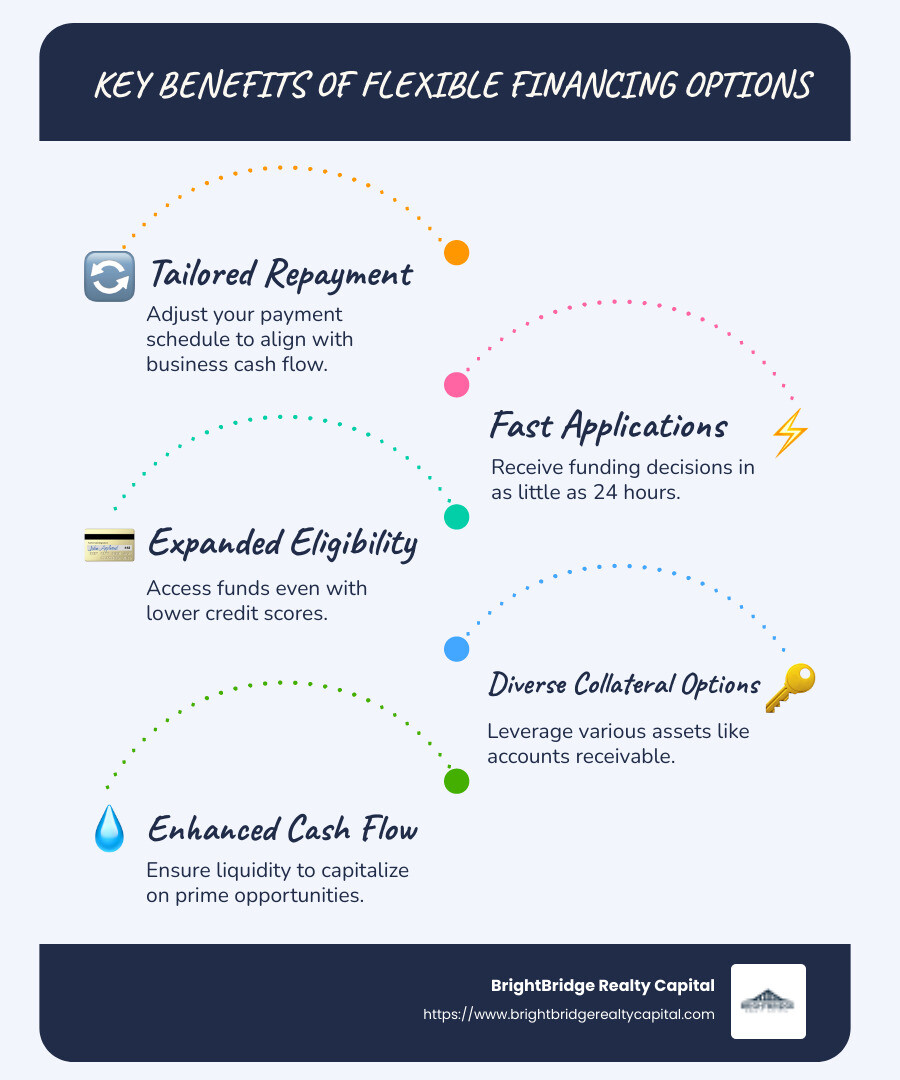Navigating Flexible Financing: A Comprehensive Guide

Flexible financing options are changing the way real estate investors secure funding. For those who feel stuck with slow loan processes and high rates, flexible financing offers a breath of fresh air. Here’s a quick rundown of what it can do for you:
- Tailor-made repayment plans: Adjust payments to match your cash flow.
- Swift applications: Get funding decisions fast, often within 24 hours.
- Expanded eligibility: Access funds even with a lower credit score.
- Diverse collateral: Use assets like accounts receivables.
In real estate, timing is everything. Imagine finding a prime investment property, but missing out because traditional bank loans take too long. Flexible financing solves this by offering customizable solutions that keep your projects on track.
Consider business lines of credit and working capital advances, two popular flexible financing solutions. They are ideal for covering unexpected expenses, managing cash flow, or seizing opportunities that require immediate action.
Flexible financing isn't just an answer to common lending woes. It's a strategic asset for ambitious investors who need quick access to capital, allowing them to act decisively in a competitive market.
Ready to learn more about how flexible financing can fuel your real estate ventures? Stick around as we explore various solutions, their unique benefits, and how BrightBridge Realty Capital can guide you through the process.

Flexible financing options word roundup:
- New York real estate funds
- commercial real estate loans new york
- stated income real estate loans new york
Understanding Flexible Financing Options
Flexible financing options are all about making your financial journey smoother and more adaptable. Let's break down how they can help you manage your investments more effectively.
Custom Repayment Plans
One of the standout features of flexible financing options is the ability to tailor your repayment schedule to fit your unique cash flow needs. For instance, if your business is seasonal, you can opt for lower payments during slow months and catch up when your income is higher. This flexibility ensures that you’re not overburdened during lean periods.

Streamlined Application Process
Forget about the tedious paperwork and long waiting times typical of traditional loans. With flexible financing, the application process is much quicker and straightforward. Decisions can often be made within 24 hours, allowing you to seize opportunities as they arise. You won't need to dig up detailed business plans or cash flow forecasts, making it perfect for those who need fast funding.
Wider Availability
Traditional banks often have strict criteria, but flexible financing options are more accessible. Even if you have a lower credit score, you can still qualify. Lenders in this space consider a broader range of factors, such as your business history and recurring revenue, making it easier for more people to access the funds they need.
In summary, flexible financing is designed to adapt to your needs, whether it’s through custom repayment plans, a streamlined application process, or wider availability. These options are here to help you steer the complexities of real estate investments with ease and confidence.

Next, we'll dive into the various types of flexible financing solutions available, each with its own set of benefits custom to meet your specific needs.
Types of Flexible Financing Solutions
When it comes to flexible financing options, there are plenty of solutions to fit your business needs. Let's explore some of the most popular ones.
Business Line of Credit
Think of a business line of credit as a financial safety net. It works like a credit card with a preset limit. You draw funds as needed and only pay interest on what you borrow. This is ideal for managing cash flow, covering unexpected expenses, or seizing short-term opportunities without the burden of a full loan.
Working Capital Advance
Need a quick cash injection to keep things running smoothly? A working capital advance provides a lump sum to cover short-term operational needs. Unlike traditional loans, this option often comes with flexible repayment terms, like daily or weekly payments, making it easier to manage your cash flow.
Equipment Financing
Buying new equipment can be expensive, but equipment financing makes it manageable. This option lets you spread the cost over time. You can choose to own the equipment or lease it with an option to buy. Plus, the equipment itself often serves as collateral, which can ease the approval process.
Invoice Financing
Waiting for clients to pay can strain your cash flow. Invoice financing, also known as accounts receivables financing, lets you borrow against your outstanding invoices. You get a portion of the invoice value upfront, and when your client pays, you receive the remaining balance minus fees. It's a great way to get immediate cash without waiting for payments.
Merchant Cash Advances
If your business relies heavily on credit card sales, a merchant cash advance might be for you. You receive a lump sum upfront and repay it through a percentage of your daily credit card sales. It’s quick and easy to qualify for, but it can be more expensive than other options.
Revenue-Based Financing
Similar to merchant cash advances, revenue-based financing provides capital in exchange for a percentage of your future revenue. The difference? It’s based on total sales, not just credit card transactions. This can be a good fit if you want to align repayments with your business performance.
Bridge Lending
Bridge lending is all about timing. It's designed to cover short-term gaps while you secure long-term funding. Whether you're waiting for a sale to close or need to purchase inventory, bridge loans offer quick access to cash, often without the lengthy approval process of traditional loans.
Crowdfunding
Crowdfunding taps into a community of investors to fund your project. You might offer rewards or equity in return. Platforms like Kickstarter have made it easier than ever to reach potential backers and raise the funds you need.
Venture Capital
Venture capital is for businesses looking to scale quickly. Investors provide funding in exchange for equity, aiming to cash out within a few years. While you may give up some control, the expertise and resources that come with venture capital can be invaluable.
Equity Financing
Equity financing involves selling a stake in your business to raise funds. This can come from individual investors, angel investors, or venture capitalists. It's a way to raise capital without taking on debt, but be prepared to share ownership and profits.
Peer-to-Peer Lending
Peer-to-peer lending connects you directly with individual lenders willing to fund your business. It often offers more flexible terms than traditional bank loans. You can find options ranging from lines of credit to more structured loans, giving you the flexibility to choose what suits you best.
Each of these flexible financing options comes with its own set of advantages. The key is to understand your business needs and choose the solution that aligns best with your goals.
Next, we'll weigh the advantages and disadvantages of these flexible financing solutions to help you make an informed decision.
Advantages and Disadvantages of Flexible Financing
When it comes to flexible financing options, there are clear pros and cons to consider. Let's break these down to help you decide if it's the right choice for your business.
Advantages
Faster Access to Capital
One of the biggest perks is speed. Flexible financing solutions often have a streamlined application process, which means you can get the funds you need quickly. This is crucial if you need to seize a growth opportunity or cover an unexpected expense.
Relaxed Eligibility Requirements
Traditional bank loans can be tough to qualify for, especially if your credit score is less than stellar. Flexible financing often has more relaxed criteria. Providers might use a soft credit check, so your credit score won’t take a hit just for applying. This opens doors for startups and businesses with limited credit history.
Credit Rating Improvement
Managing your flexible financing well can actually boost your credit score. Many lenders report your payment history to credit bureaus. So, if you make timely payments, you could see your FICO score go up, making it easier to secure future financing.
Disadvantages
Higher Costs
The convenience of flexible financing often comes at a price. Interest rates and fees tend to be higher compared to traditional loans. This reflects the higher risk lenders take on by offering quick and accessible funding. It's important to weigh these costs against the benefits of fast access to capital.
Shorter Repayment Terms
While shorter terms can mean paying less interest overall, they can also strain your finances. If your expected revenue is delayed, you might struggle to make repayments on time. This could lead to financial pressure and complicate cash flow management.
Risk of Debt Cycle
The ease of access to funds can lead to a cycle of debt if not managed carefully. Businesses may become reliant on continuous borrowing to stay afloat. This could result in financial instability, especially if revenue projections don’t pan out as expected.
Understanding these pros and cons is essential in choosing the right financing option. Next, we'll explore how to select the best flexible financing solution based on your specific needs and circumstances.
How to Choose the Right Flexible Financing Option
Choosing the right flexible financing option can feel overwhelming, but breaking it down into key factors can simplify the decision-making process. Here’s what you need to consider:
Funding Needs
First, identify your business's specific funding needs. Are you looking for capital to cover operational costs, purchase new equipment, or manage seasonal cash flow fluctuations? Each need might require a different type of financing. For example, if you need quick cash for short-term needs, a business line of credit might be ideal. On the other hand, equipment financing is better suited for purchasing machinery or vehicles.
Cost Considerations
Next, weigh the costs associated with each option. Flexible financing often comes with higher interest rates and fees compared to traditional loans. It's crucial to compare these costs against the potential benefits. Ask yourself: Will the extra cost of quick capital lead to significant growth or savings? If the answer is yes, the higher cost might be justified.
Cash Flow Management
Effective cash flow management is crucial when using flexible financing. Look at your business's cash flow patterns to determine which repayment schedule aligns best with your revenue. For instance, if your business experiences seasonal fluctuations, consider options with custom repayment plans. This way, you can pay less during slow periods and more when your cash flow is strong.
By focusing on these three areas—funding needs, cost considerations, and cash flow management—you can make an informed decision that supports your business's growth and stability.
Next, we’ll dive into frequently asked questions about flexible financing to clear up any lingering doubts.
Frequently Asked Questions about Flexible Financing Options
What is flexible financing?
Flexible financing refers to a range of funding solutions that adapt to the unique needs of businesses. Unlike traditional loans, these options offer custom repayment plans, quick application processes, and broader availability. They are designed to cater to businesses with fluctuating cash flows or specific funding needs, like seasonal businesses or startups with limited credit history.
The key characteristics of flexible financing include:
- Custom repayment options: Payments can be adjusted based on business cash flow, allowing lower payments during slow periods.
- Streamlined application process: Often requires less documentation and offers faster decisions, sometimes within 24 hours.
- Wider availability: Accessible to businesses with lower credit scores or less credit history.
How does flexible financing differ from traditional loans?
Traditional loans and flexible financing options serve different purposes and come with distinct features.
Traditional Loans:
- Typically have fixed repayment schedules and interest rates.
- Require extensive documentation and longer approval times.
- Often have stricter credit requirements.
Flexible Financing Options:
- Offer variable repayment terms custom to business needs.
- Have quicker application processes and approvals.
- Are more accessible to businesses with lower credit scores.
Benefits of flexible financing include faster access to funds and more relaxed eligibility requirements. However, these advantages come at a cost. Flexible financing usually involves higher interest rates and fees, reflecting the increased risk taken by lenders.
What are the risks associated with flexible financing?
While flexible financing provides numerous benefits, it also comes with potential risks that businesses should be aware of:
- Higher costs: The convenience of quick access and flexible terms often results in higher interest rates and fees compared to traditional loans.
- Shorter repayment terms: These can strain cash flow if not managed carefully, especially if expected revenue is delayed.
- Risk of debt cycle: The ease of access to funds can lead to a reliance on borrowing, potentially causing a business to fall into a cycle of debt. This may result in financial instability if not properly managed.
Understanding these risks is crucial for businesses to use flexible financing effectively. By carefully evaluating their financial situation and repayment capacity, businesses can mitigate these risks and leverage flexible financing to support growth.
Conclusion
At BrightBridge Realty Capital, we understand that every real estate investment is unique. That's why we offer customized solutions custom to meet your specific needs. Our flexible financing options are designed to help you seize opportunities quickly, without the hassles of traditional lending.
One of our standout features is our fast closings. We know that timing is crucial in real estate, so we streamline the process to get you funded often within a week. This means you can move forward with your projects without unnecessary delays.
Moreover, as direct lenders, we cut out the middleman. This allows us to offer competitive rates that are hard to beat. Whether you're flipping properties, starting construction, or expanding your rental portfolio, our goal is to provide you with the financial flexibility you need.
Partner with us at BrightBridge Realty Capital for a seamless financing experience that keeps your investment strategy moving forward. Let us help you bridge the gap with smart, flexible funding that aligns with your goals.


